Biografia
Natural de Vassouras-RJ, Pedro Paulo Junior começa a tocar trompete aos seis anos por influência de seu pai, o trompetista Pedro Paulo. Só ingressou no estudo formal de música aos 18 anos, na Musiarte - Curso Integrado de Música-RJ, aprendendo teoria, harmonia, percepção e violão. Em 1998 entra para o Conservatório Brasileiro de Música do Rio de Janeiro, tendo aulas com o trompetista Paulo Roberto Mendonça. No ano seguinte, termina a faculdade de jornalismo e começa a atuar na área musical. Durante sete anos foi integrante da Itiberê Orquestra Família, liderada pelo compositor e arranjador Itiberê Zwarg, baixista do grupo de Hermeto Pascoal há 40 anos. Neste período trabalha como jornalista freelancer para a revista Áudio, Música e Tecnologia e a gravadora Dubas Música do compositor e produtor Ronaldo Bastos. Deu continuidade a seus estudos de trompete com o doutor em trompete Nailson Simões, em cursos de extensão da UNI-Rio.
Em 1999 recebe um prêmio da prefeitura do Rio de Janeiro no 1º Prêmio Jovem Artista, modalidade música pela composição "Fruta Flor" - parceria com Marcos Vidal. Entre os jurados estava o compositor e violonista Guinga. Grava o primeiro disco da Itiberê Orquestra Família “Pedra do Espia”. Álbum duplo que fica entre os dez melhores CDs de 2001, segundo o jornal O Globo. Realiza shows de lançamento com grande repercussão, no teatro Carlos Gomes no Rio e no Tom Brasil em São Paulo. Participou do II Festival Brasil Instrumental de Tatuí-SP. Realizou vários shows com a orquestra em 2002. Os principais foram: Centro de Artes da UFF no projeto "Interculturalidades", com a participação de Hermeto Pascoal e no Museu de Arte da Pampulha em Belo Horizonte. Faz uma temporada em 2003 com a orquestra no Centro Cultural da Justiça Federal, no Rio e, no ano seguinte, na Sala São Paulo, no projeto "Concertos Matinais da Sala São Paulo".
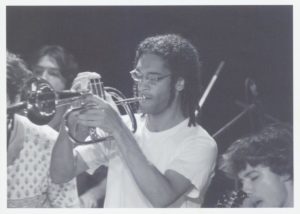
Em 2003 recebe o convite de Itiberê para realizar monitoria em suas Oficinas de Música Universal na escola de música Pró-Arte, no Rio.
Começa a tocar na noite do Rio, no bairro da Lapa, em pequenas formações como trompetista e cantor. Também passou a se dedicar ao canto na Itiberê Orquestra.
Como trompetista, atua em orquestras de baile, entre elas a Ases de Ouro do trompetista Darcy da Cruz e o grupo Samba Plugado.
Em 2005 participa com a I.O.F. do Mercado Cultural, em Salvador, com workshop e show no Teatro Castro Alves. Em 2006 faz show de lançamento do segundo álbum duplo da I.O.F. - "Calendário do Som" em Curitiba, Florianópolis, Porto Alegre, Teatro Solis em Montevidéu e no La Trastienda Club, em Buenos Aires. Desliga-se da orquestra mas continua auxiliando nas oficinas musicais de Itiberê. Com patrocínio da Petrobrás desenvolve, junto com Itiberê e o guitarrista Bernardo Ramos, o caderno de partituras e cd multimídia das oficinas, contendo a gravação de 16 composições de Itiberê e executadas pelos alunos.
Faz apresentação com o grupo Samba Plugado no lançamento do projeto em homenagem a "Mario Lago, Homem do Século XX", no Clube Fluminense, no Rio. Começa a compor e fazer arranjos para o grupo. Com ele, realiza em 2007 o projeto Nova Lapa numa das mais importantes casas noturnas do Rio - Estrela da Lapa. O projeto teve a participação do pianista Cristóvão Bastos, Rubinho Jacobina, Pedro Holanda e as Chicas. No mesmo ano foi convidado por Itiberê para cantar numa apresentação da I.O.F. com o compositor Antônio Bruno, pai de Itiberê. Neste show histórico, apenas com composições de Antônio Bruno e com participação de Alfredo Del Penho e a cantora argentina Liliana Herrero, interpreta "Sambista de Arranha-Céu".
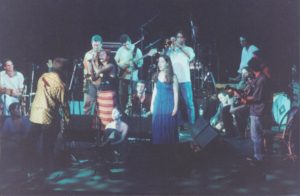
Em 2008 integra o grupo Rio Latin Jazz, um dos poucos grupos de salsa do Rio de Janeiro.
Em 2009 inicia um trabalho de organização, digitalização e catalogação do acervo de partituras do Museu da Imagem e do Som do Rio de Janeiro. Ao mesmo tempo passa a se dedicar mais à composição e teve sua música “Fruta Flor” interpretada pela pianista, cantora e compositora Clarice Assad, em shows pelos EUA. Nesse mesmo ano participa como trompetista e produtor do show de seu pai, Pedro Paulo, o célebre trompetista do samba-jazz. O show foi realizado na Livraria Toca do Vinícius. Nessa ocasião seu pai grava as mãos para o acervo calçada da fama de Ipanema. Outros shows foram realizados no Teatro Café Pequeno em junho de 2011 e no retorno do músico ao Beco das Garrafas em novembro de 2014.
Em 2010 o grupo Água Viva passa a interpretar sua composição “Dr Cornelius” que também foi gravada no CD do grupo chamado "O louco", lançado em 2015.
Em 2011 faz o primeiro carnaval do Bloco do Sargento Pimenta integrando o naipe de sopros. Viaja pelo Brasil realizando apresentações com o bloco desde então.
Integra o grupo de sopros Inventos que lança um disco homônimo em 2012. Estão no CD duas composições, a canção “Encontro das Águas” (em parceria com Daniel Basílio) e “Dr. Cornelius”. Também integra o grupo Fanfarrada como trompetista e arranjador, fazendo vários shows pelo Brasil e também em Bogotá-Colômbia em meados de 2013. Seus arranjos possuem destaque no repertório como o funk carioca orquestrado "Coração Black" e a mistura do samba e do candombe (ritmo uruguaio) em "Yo no era eu".
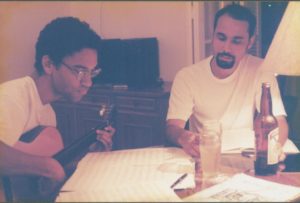
Born in Vassouras-RJ, Pedro Paulo Junior begins playing trumpet at age six through influence of his father, trumpet player Pedro Paulo. He only joined the formal study of music at age 18, at Musiarte - Integrated Course of Music in Rio, learning theory, harmony, perception and guitar. In 1998 he entered the Brazilian Conservatory of Music in Rio de Janeiro, taking lessons with trumpeter Paulo Roberto Mendonça. The following year, he finished the journalism school and began to work with music. For seven years he was a member of the Itiberê Orquestra Família, led by composer and arranger Itiberê Zwarg, bassist for the group Hermeto Pascoal 40 years ago. In this period he works as a freelance journalist for the magazine Audio, Music and Technology and Dubas Music label of composer and producer Ronaldo Bastos. He continued his studies of trumpet with trumpet doctor Nailson Simões, in UNI-Rio.
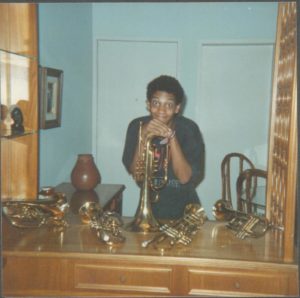
In 1999 he received an award from the city of Rio de Janeiro in the 1st Young Artist Award, music for the composition "Fruta Flor" - a partnership with Marcos Vidal. Among the jurors was composer and guitarist Guinga. Records the first album of the Itiberê Orquestra Família "Pedra do Espia". Double album that is among the ten best CDs of 2001, according to the newspaper O Globo. He performs shows with great repercussion, in the theater Carlos Gomes in Rio and Tom Brasil in São Paulo. Participated in the II Brazil Instrumental Festival of Tatuí-SP. She performed several concerts with the orchestra in 2002. The main ones were: UFF Arts Center in the project "Interculturalidades", with the participation of Hermeto Pascoal and at the Pampulha Art Museum in Belo Horizonte. He has spent a season in 2003 with the orchestra at the Centro Cultural da Justiça Federal, in Rio, and the following year, at Sala São Paulo, in the project "Concerts Matinais Sala São Paulo".In 2003 he received the invitation of Itiberê to conduct monitoring at his Universal Music Workshops at the Pro-Arte music school in Rio.He begins to play in the night of Rio, in the neighborhood of Lapa, in small formations like trumpeter and singer. He also began to dedicate himself to singing in the Itiberê Orchestra.As a trumpeter, he play in dancing, among them the Ases de Ouro of trumpeter Darcy da Cruz and the group Samba Plugado.
In 2005 he participated with I.O.F. Of the Cultural Market, in Salvador, with workshop and show at the Castro Alves Theater. In 2006 he shows the release of the second double album of I.O.F. - "Calendar of Sound" in Curitiba, Florianópolis, Porto Alegre, Teatro Solis in Montevideo and La Trastienda Club in Buenos Aires. He leaves the orchestra but continues to assist in the musical workshops of Itiberê. With the sponsorship of Petrobras, together with Itiberê and guitarist Bernardo Ramos, he develops the scoresheet and multimedia CD of the workshops, containing the recording of 16 compositions by Itiberê and performed by the students.
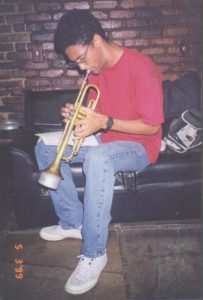
He makes a presentation with the Samba Plugado group at the launch of the project in homage to "Mario Lago, Man of the 20th Century", at Clube Fluminense, Rio. He begins to compose and make arrangements for the group. With him, he realized in 2007 the project Nova Lapa in one of the most important nightclubs of the Rio - Estrela da Lapa. The project was attended by the pianist Cristóvão Bastos, Rubinho Jacobina, Pedro Holanda and Chicas. In the same year he was invited by Itiberê to sing in a presentation of I.O.F. With the composer Antônio Bruno, father of Itiberê. In this historical show, only with compositions by Antônio Bruno and with the participation of Alfredo Del Penho and the Argentine singer Liliana Herrero, he plays "Sambista de Arranha-Céu".
In 2008 he joined the group Rio Latin Jazz, one of the few salsa groups in Rio de Janeiro.
In 2009 he began a work of organization, digitalization and cataloging of the collection of scores of the Museu da Imagem e do Som do Rio de Janeiro. At the same time he began to devote more to the composition and had his song "Fruta Flor" performed by the pianist, singer and composer Clarice Assad, in shows by the USA. That same year he participated as a trumpet player and producer of the show of his father, Pedro Paulo, the famous trumpet player of samba-jazz. The show was held at Toca do Vinícius Bookstore. On this occasion his father records his hands to the hall of Ipanema's fame. Other shows were performed at the Teatro Café Pequeno in June 2011 and the musician's return to Beco das Garrafas in November 2014.
In 2010 the Água Viva group began to interpret their composition "Dr Cornelius" that also was recorded in the CD of the group called "O Louco", released in 2015.
In 2011 he made the first carnival of the carnival group Bloco do Sergento Pimenta integrating the suit of blows. He traveled around Brazil performing presentations with the group ever since.
He is part of the Inventos group that launches a homonymous album in 2012. Two songs are on the CD, the song "Encontro das Águas" (in partnership with Daniel Basílio) and "Dr. Cornelius ". He is also part of the Fanfarrada group as a trumpeter and arranger, doing several shows in Brazil and also in Bogota-Colombia in 2013. His arrangements are prominent in the repertoire such as the funk Carioca " Coração Black" and the mix of samba and candombe (uruguayan rhythm) in "Yo no era eu".
